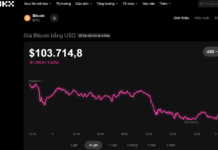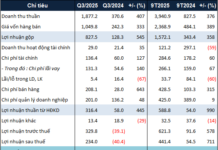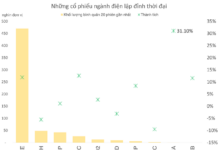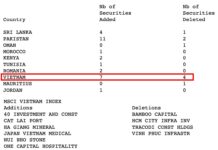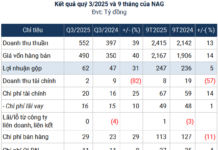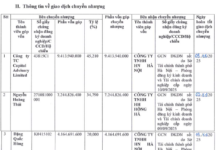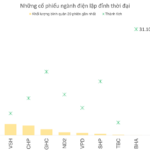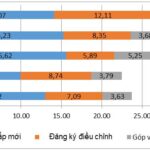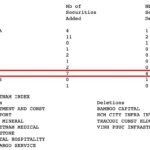This is based on projected credit growth expected to be more positive thanks to low interest rates, better economic recovery, and a warming real estate market…; while market valuations are also very attractive…
According to reports, the banking sector has had a good growth rate over the past 3 months. In particular, many large-cap stocks have seen growth rates of tens of percent (as of the end of the session on February 21, 2024), such as CTG (+30.7%), MBB (+27.32%), TCB (+21.5%), HDB (+18.09%), BID (+15.7%), ACB (+13.3%)…
One noticeable characteristic is that although there has been positive progress, the upward trend has only been seen in large-cap stocks. Meanwhile, many small-scale bank stocks have shown little growth or even decreased, such as VBB which decreased by 0.94%, or EIB and ABB which increased by only 1.9% and 2.44% respectively. Some small and medium-sized stocks have also seen growth, but to a lesser extent, such as: KLB (+6.09%), NAB (+5.7%), VPB (+4.77%)…

The banking sector is attracting the attention of many investors
In general, the “king” group of stocks has shown good growth thanks to the positive sentiment of investors after news about legal support, especially in the corporate bond and real estate markets.
In addition, another boost comes from positive business results. It should be noted that the banking sector is the main contributor to the overall market profit in the fourth quarter of 2023. The net profit of this group increased by 22.5% compared to the same period in the fourth quarter of 2023 and increased by 3.8% for the whole year of 2023. VnDirect believes that the positive business results of banks are due to rapid credit growth in the period; strong growth in non-interest income (fee income, foreign exchange transactions), industry-wide growth of 20%, and a 5% reduction in provision for loan losses.
It is not difficult to see that banks with double-digit stock increases are units with higher net profit growth in 2023 compared to the same period last year.
The “king” group of stocks is highly valued and expected to continue to attract capital in 2024. Mr. Lã Giang Trung – CEO of Passion Investment affirmed that banks will be the stock group of 2024. This view is based on the fact that low interest rates will be maintained and low valuations with P/E ratios of 5-6 times and P/B ratios of 1-1.2 times, banking stocks will have many advantages for strong growth.
Agreeing with the view of Passion Investment’s CEO, Mr. Michael Kokalari – Director of Macroeconomic Analysis and Market Research at VinaCapital, believes that bank stocks will benefit from profit growth, from about 7% in 2023 to 18% in 2024, and the valuation of bank stocks in Vietnam is currently lower than a standard deviation compared to the average of the past 5 years (currently trading at around 1.8x P/B compared to an expected ROE of 17% in 2024).
“We expect the profits of Vietnamese banks to be driven by rapid credit growth for both real estate developers and home buyers, in line with modest expectations for real estate development this year,” assessed Mr. Michael Kokalari.
Similarly, BSC Securities Company looks optimistically at the prospects for bank earnings in 2024. This unit expects the profit growth of the entire banking sector to recover with the main impetus coming from the expansion of the net interest margin (NIM), but the speed will depend on credit demand and asset quality. However, BSC believes that the valuation of the industry has reflected the uncertainties mentioned above.
“BSC believes that the current valuation of the industry is still appropriate for accumulation, especially for private groups. We also note that tighter risk management regulations and improved balance sheet health are the key differences in the current cycle compared to the past,” the company analyzed.
ABS Securities Company also optimistically expects the banking sector in 2024 to gradually recover thanks to many supportive factors related to a reduced interest rate environment that supports borrowers and a recovering real estate market.
Specifically, the improved legal framework with the introduction of the amended Real Estate Business Law and Credit Institution Law. In addition, the effectiveness of Circular 02 and Circular 06 until mid-2024 will help banks proactively support customers facing difficulties. Along with that, the record-low interest rate environment is expected to last for the first 2-3 quarters of the year, supporting businesses in reducing capital costs, improving profits, and increasing credit demand for business and consumption. The NIM is expected to improve from the slower decline in lending rates compared to deposit rates. Improving cash flow for businesses will reduce bad debt pressure for banks, especially from the real estate industry.
Meanwhile, SSI Research notes that 2024 continues to be a challenging year for the banking industry in terms of asset quality. However, the overall situation will improve compared to 2023, mostly due to the lower cost of funds and improved pre-provision operating profit (PPOP) which provides banks with more space to create a better loan loss buffer.
SSI Research’s data shows that the loan loss buffer at most banks is lower than the value of problematic loans. Although SSI Research believes that banks need to set aside additional provisions to improve asset quality, the provisioning time may be extended due to factors such as bad debt issues and the legal status of unfinished real estate projects; lending risks for home purchases at projects with legal issues.
“We maintain a neutral view on the banking sector in 2024 as the process of reinforcing loan loss buffers continues, making overall sector profitability unable to gain strong momentum immediately. However, we still prefer stocks with good asset quality because these banks will complete bad debt resolution much earlier than other stocks in the same industry,” emphasized SSI Research.










